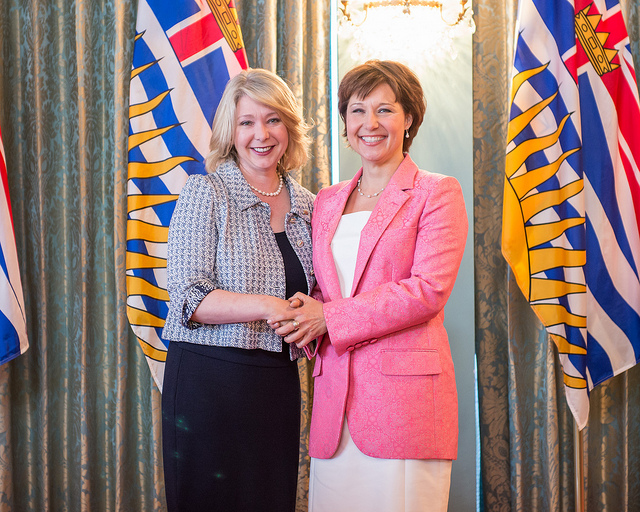Like this article? rabble is reader-supported journalism. Chip in to keep stories like these coming.
For eight years, British Columbia has earned global praise for its carbon tax. But without a reaffirmed commitment to tackling climate change, these years of accolades may be numbered.
Most recently, The New York Times editorial board observed that B.C. “placed the highest price on emissions in North America” with “no negative impact on the province’s growth rate.” Last month, the U.S.-based Carbon Tax Center described B.C.’s $30-per-tonne levy as the “most comprehensive and transparent carbon tax in the Western Hemisphere, if not the world.”
Part of the province’s ground-breaking 2008 Climate Action Plan, the carbon tax took effect in July of that year at a rate of $10 per tonne of carbon pollution. The tax was increased by $5 per year until 2012. It’s currently frozen at $30 until 2018.
Although B.C.’s emissions initially fell under the Climate Action Plan, they have been creeping up in the past few years and are projected to continue rising without stronger climate policies. It’s now clear the province is on track to miss its legislated targets for reducing carbon pollution.
Fortunately, Premier Christy Clark’s government is working on a new Climate Leadership Plan, which is due out this spring. On January 25, the province kicked off a second 60-day, web-based public consultation for the long-awaited plan. This is a critical opportunity to rally public support for ambitious new actions.
Unfortunately, similar to the previous consultation period, the government will not be putting in the kind of resources necessary to ensure robust engagement across the province. There will not be any town halls or public presentations to solicit feedback.
Given the need to create a plan that all British Columbians can take pride in, it’s disappointing that the government doesn’t intend to hold a more robust consultation on the plan. In the coming weeks, the Pembina Institute plans to host a series of webinars, dialogues and a Twitter chat to help encourage as much participation from British Columbians as possible.
It’s worth noting that B.C. already has the blueprint for a strong Climate Leadership Plan. In November, ahead of the United Nations climate-change conference in Paris, Environment Minister Mary Polak released the report of the province’s Climate Leadership Team. Its members included experts from the business, academic and environmental communities as well as representatives from the provincial government, First Nations and local governments.
The team’s 32 recommendations are designed to help the province reduce carbon pollution while maintaining a strong economy. They cover everything from carbon pricing and emissions-reduction targets to building standards and industrial regulations. Key recommendations include:
- Increasing B.C.’s carbon tax by $10 per tonne per year starting in 2018 (and using the incremental revenue to lower the PST from 7 per cent to 6 per cent, protect low-income households and implement measures to maintain the competiveness of emissions-intensive, trade-exposed industry);
- Cutting methane emissions from the natural-gas sector by 40 per cent within five years;
- Committing to 100 per cent renewable energy on the electricity grid by 2025 (except where fossil fuels are required for backup);
- Requiring new buildings to be capable of meeting most of their annual energy needs with onsite renewable energy within the next 10 years (and starting in 2016 for new public buildings);
- Requiring an increasing percentage (rising to 30 per cent by 2030) of light-duty vehicles sold in the province to be zero-emission vehicles;
- Reviewing the Climate Leadership Plan every five years.
At a minimum, a strong Climate Leadership Plan must include a commitment to implement all of the Climate Leadership Team’s recommendations. According to the team, the government must adopt the entire package of recommendations to put B.C. on a “credible pathway” to meeting its legislated 2050 emissions target.
“By taking decisive action now to reduce our carbon pollution and stimulate innovation B.C. will be sending consistent, credible long term policy signals to the marketplace, protecting our economy and our health, and working to ensure a stable climate,” the team’s report states.
Let’s make sure that the government — and opposition parties — know how much support there is for a strong Climate Leadership Plan and the opportunities it would provide for the province. Take action by submitting your comments to [email protected] by March 25, writing a letter to the editor, spreading the word on social media and participating in our events.
With the upcoming first ministers’ meeting on climate change, the recent adoption of the Paris Agreement and Alberta’s new plans for a carbon tax and coal phase-out, the time is ripe for B.C. to take its place again among the world’s climate leaders.
Stephen Hui is the communications lead for British Columbia at the Pembina Institute, a non-profit think-tank that advocates for strong, effective policies to support Canada’s clean-energy transition. Follow him on Twitter: @StephenHui.
This article previously appeared on Ricochet.
Like this article? rabble is reader-supported journalism. Chip in to keep stories like these coming.
Image: Flickr/bcgovphotos



